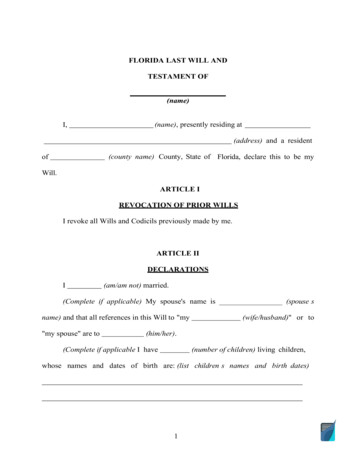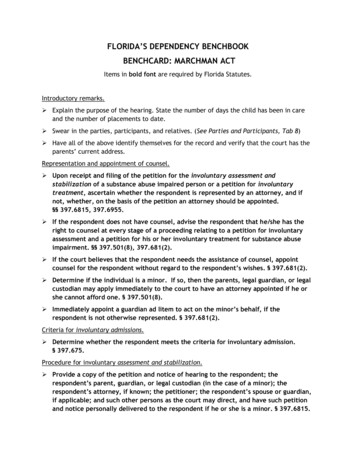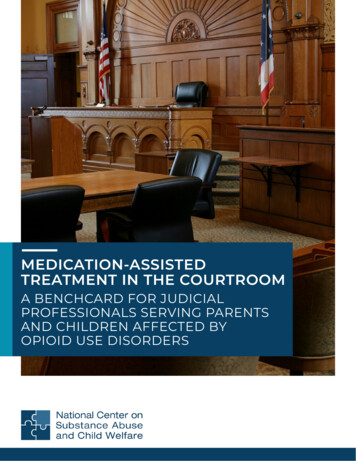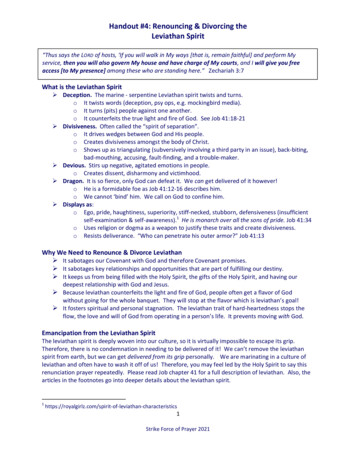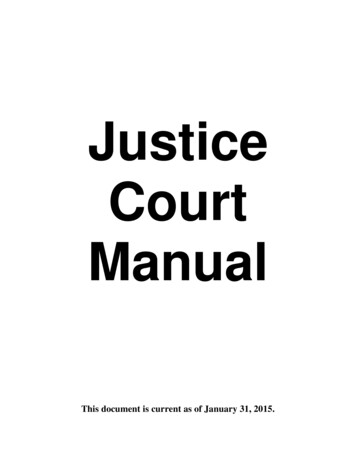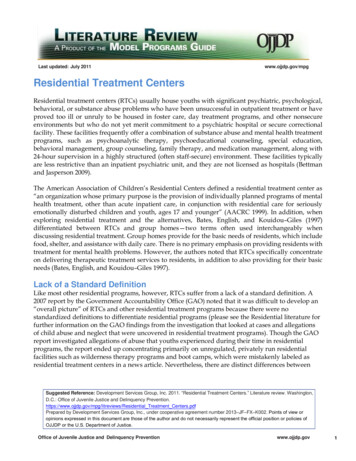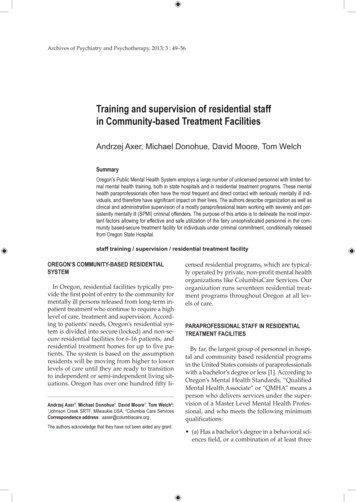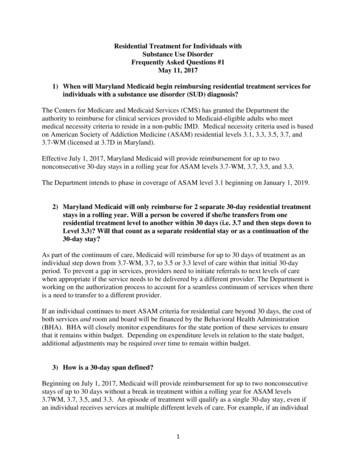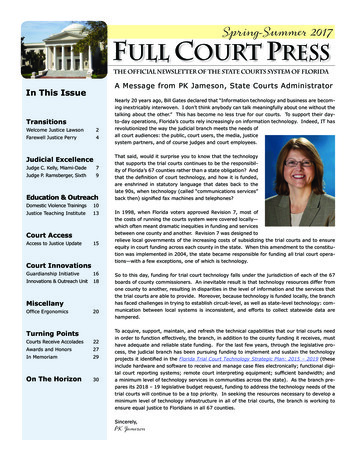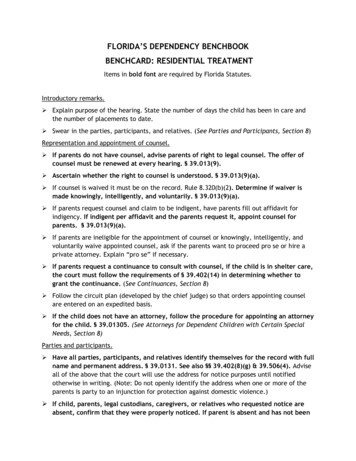
Transcription
FLORIDA’S DEPENDENCY BENCHBOOKBENCHCARD: RESIDENTIAL TREATMENTItems in bold font are required by Florida Statutes.Introductory remarks. Explain purpose of the hearing. State the number of days the child has been in care andthe number of placements to date. Swear in the parties, participants, and relatives. (See Parties and Participants, Section 8)Representation and appointment of counsel. If parents do not have counsel, advise parents of right to legal counsel. The offer ofcounsel must be renewed at every hearing. § 39.013(9). Ascertain whether the right to counsel is understood. § 39.013(9)(a). If counsel is waived it must be on the record. Rule 8.320(b)(2). Determine if waiver ismade knowingly, intelligently, and voluntarily. § 39.013(9)(a). If parents request counsel and claim to be indigent, have parents fill out affidavit forindigency. If indigent per affidavit and the parents request it, appoint counsel forparents. § 39.013(9)(a). If parents are ineligible for the appointment of counsel or knowingly, intelligently, andvoluntarily waive appointed counsel, ask if the parents want to proceed pro se or hire aprivate attorney. Explain “pro se” if necessary. If parents request a continuance to consult with counsel, if the child is in shelter care,the court must follow the requirements of § 39.402(14) in determining whether togrant the continuance. (See Continuances, Section 8) Follow the circuit plan (developed by the chief judge) so that orders appointing counselare entered on an expedited basis. If the child does not have an attorney, follow the procedure for appointing an attorneyfor the child. § 39.01305. (See Attorneys for Dependent Children with Certain SpecialNeeds, Section 8)Parties and participants. Have all parties, participants, and relatives identify themselves for the record with fullname and permanent address. § 39.0131. See also §§ 39.402(8)(g) & 39.506(4). Adviseall of the above that the court will use the address for notice purposes until notifiedotherwise in writing. (Note: Do not openly identify the address when one or more of theparents is party to an injunction for protection against domestic violence.) If child, parents, legal custodians, caregivers, or relatives who requested notice areabsent, confirm that they were properly noticed. If parent is absent and has not been
served, inquire about the diligent search. §§ 39.402(5)(a) & 39.502(1). (See Service,Section 8) Make findings on the record of whether each caregiver did or did not receive actual noticeof the hearing; whether each caregiver is present, either in person or remotely; and, ifpossible, the reasons why any caregivers are not present. Provide each caregiver a meaningful opportunity to be heard and provide input to thecourt. § 39.502(17). For all relatives who requested notification pursuant to § 39.301(14)(b), inquirewhether each such relative has a report to submit to the court or desires to speak tothe court regarding the child. § 39.502(19).Suitability assessment. If DCF believes a child in its custody is emotionally disturbed and may need residentialtreatment, an examination and suitability assessment must be conducted beforeplacement of the child. § 39.407(6)(b). Placement without prior approval of the court must be made pursuant to § 39.407(6).The child may also be placed by the court in accordance with an order of involuntaryexamination or involuntary placement pursuant to § 394.463 or § 394.467.§ 39.407(6). Verify that DCF has provided notice to the guardian ad litem and court of placement ofthe child in residential treatment along with a copy of the suitability assessment bythe qualified evaluator. § 39.407(6). Appoint a guardian ad litem if one has not already been appointed. § 39.407(6);8.350(a)(3). (See Guardian ad Litem, Section 4) The court shall also appoint an attorney for the child. All appointments must conform tothe provisions of Rule 8.231. Rule 8.350(a)(3). Verify that the guardian ad litem and the attorney, and if the child is a member of aMedicaid managed plan, the plan that is financially responsible for the child’s care inresidential treatment, have met with the child and have had the opportunity to discussthe child’s suitability for residential treatment with the qualified evaluator conductingthe assessment. § 39.407(6)(c)3; See also Rule 8.350(a)(3). Verify that the evaluator’s written assessment is compete and that DCF has provided acopy to the court and to all parties. Rule 8.350(a)(3). Verify that the guardian ad litem has provided a written report to the court and to allparties indicating the guardian ad litem’s recommendation as to the child’s placement inresidential treatment and the child’s wishes. Rule 8.350(a)(3).Hearing time frames and attendance. Verify that the guardian ad litem is represented by an attorney at all proceedings unlessthe guardian ad litem is acting as an attorney. Rule 8.350(a)(6).
Upon the filing of a motion for placement, set the matter for a status hearing within 48hours, excluding weekends and holidays. Rule 8.350(a)(7). Verify that DCF has provided timely notice of the date, time, and place of the hearing toall parties and participants. Rule 8.350(a)(7). Verify that the child’s attorney or guardian ad litem has notified the child of the date,time, and place of the hearing. Rule 8.350(a)(8). Do not proceed with the hearing without the presence of the child’s attorney. Rule8.350(a)(8). The guardian ad litem may be excused by the court for good cause shown. Rule8.350(a)(8). If no party disagrees with DCF’s motion at the status hearing, the motion for placementmay be approved. However, if any party, including the child, disagrees, set the matter forhearing within 10 working days. Rule 8.350(a)(9). The child must be present at the hearing unless a court appearance is not in the child’sbest interest. In such circumstances, the child must be provided the opportunity toexpress his or her views by a method deemed appropriate by the court. Rule 8.350(a)(10).Motion for placement. Verify that DCF’s motion includes a statement as to why the child is suitable for thisplacement and why less restrictive alternatives are not appropriate, including writtenfindings of the qualified evaluator. Rule 8.350(a)(4). Verify that DCF’s motion states whether all parties, including the child, are in agreement.Rule 8.350(a)(4). Verify that copies of the motion were served on the child’s attorney and all parties andparticipants. Rule 8.350(a)(4). If the evaluator’s written assessment indicates that the child requires immediateplacement in a residential treatment center or hospital and that such placement cannotwait for a hearing, then DCF may place the child pending a hearing, unless the courtorders otherwise. Rule 8.350(a)(5).Hearing on placement. At the hearing, consider, at a minimum, all of the following. Based on an independent assessment of the child, the recommendation of a DCFrepresentative or authorized agent that the residential treatment or hospitalization isin the child’s best interest and a showing that the placement is the least restrictiveavailable alternative. The recommendation of the guardian ad litem. A case review committee recommendation, if there has been one. The written findings of the evaluation and suitability assessment prepared by a
qualified evaluator. The views regarding placement in residential treatment that the child expresses to thecourt. Rule 8.350 (a)(11)(A)(i)-(v). Permit all parties to present evidence and witnesses concerning the suitability of theplacement. Rule 8.350(a)(11)(B). If the child is not suitable for residential treatment, order DCF to place the child inthe least restrictive setting that is best suited to meet the child’s needs.Rule 8.350(a)(11)(C).Suitability for residential treatment and the treatment plan. Verify that the qualified evaluator has conducted a personal examination andassessment of the child and made written findings that: The child appears to have an emotional disturbance serious enough to requireresidential treatment and is reasonably likely to benefit from the treatment. The child has been provided with a clinically appropriate explanation of the natureand purpose of the treatment. All available modalities of treatment less restrictive than residential treatmenthave been considered, and a less restrictive alternative that would offercomparable benefits to the child is unavailable. §§ 39.407(6)(c)1-3. Verify that a copy of the written findings of the evaluation and suitability assessmenthave been provided to DCF and to the guardian ad litem and that they have had theopportunity to discuss the findings with the evaluator. § 39.407(6)(c). Inquire as to whether within 10 days after the admission of a child to the residentialtreatment program, the program director or designee ensured that an individualizedplan of treatment was prepared by the program and was explained to the child, toDCF, and to the guardian ad litem, and submitted to DCF.§ 39.407(6)(e). Inquire if the child was involved in the preparation of the plan to the maximumfeasible extent consistent with the child’s ability to understand and participate.§ 39.407(6)(e). Inquire if the guardian ad litem and the child’s foster parents were involved to themaximum extent consistent with the child’s treatment needs. § 39.407(6)(e). Verify that a copy of the plan was provided to the child, to the guardian ad litem, andto DCF. § 39.407(6)(e). Inquire whether within 30 days of the child’s admission, the program reviewed theappropriateness and suitability of the child’s placement in the program and whetherthe program determined if the child is receiving benefit toward the treatment goalsand whether the child could be treated in a less restrictive treatment program.§ 39.407(6)(f).
Verify that the residential treatment program prepared a written report of its findingsand submitted the report to the guardian ad litem and to DCF.§ 39.407(6)(f). Verify that DCF submitted the report to the court. § 39.407(6)(e). Verify that the report includes a discharge plan for the child. § 39.407(6)(e). Verify that the residential treatment program continue to evaluate the child’streatment progress every 30 days and include its findings in a written reportsubmitted to DCF. § 39.407(6)(e).Written report of progress. DCF must submit, at the beginning of each month, to the court having jurisdictionover the child, a written report regarding the child’s progress toward achieving thegoals specified in the individualized plan of treatment. § 39.407(6)(g)1. For any child in residential treatment at the time a juridical review is held, the child’scontinued placement in residential treatment must be a subject of judicial review.§ 39.407(6)(g)3. If at any time the court determines that the child is not suitable for continuedresidential treatment, the court shall order DCF to place the child in the leastrestrictive setting that is best suited to meet his or her needs. § 39.407(6)(g)4. After the initial 3 month review, the court must conduct a review of the child’sresidential treatment plan every 90 days. § 39.407(6)(h).Continuing residential placement reviews. Schedule a hearing to review the status of the child’s residential treatment plan nolater than 3 months after the child’s admission to the residential treatment program.§ 39.407(6)(g)2. Verify that an independent review of the child’s progress toward achieving the goalsand objectives of the treatment plan was completed by a qualified evaluator.§ 39.407(6)(g)2. Verify that the independent review was submitted to the court and all parties inwriting at least 72 hours before the 3 month review hearing. § 39.407(6)(g)2. Set review hearings every 3 months, until the child is placed in a less restrictive setting. At each 3 month review hearing, if the child is not represented by an attorney, the courtmust appointed counsel. Rule 8.350(b)(2). At the 3 month review hearing the court shall determine whether the child disagrees withcontinued placement. Rule 8.350(b)(2). If the child is not suitable for continued residential treatment, order DCF to place thechild in the least restrictive setting that is best suited to meet the child’s needs. Any judicial review of a child in residential treatment must address the continued
placement of the child in residential treatment. § 39.407(6)(g)3. Order that the child be present at all hearings unless the child’s mental or physicalcondition is such that a court appearance is not in the child’s best interest. In suchcircumstances, the child must be provided the opportunity to express his or her views tothe court by an appropriate method. Rule 8.350(c). At the hearing, apply a standard of proof of clear and convincing evidence to determinewhether the evidence supports involuntary commitment of a dependent child to aresidential mental health treatment facility. Rule 8.350(d).Responsibility for costs. After a hearing, the court may order the parents or legal custodian, if found able to doso, to reimburse DCF or other provider of medical services for treatment provided. The parents or legal custodian remain financially responsible for the cost of medicaltreatment provided to the child even if they did not consent to the medical treatment.§ 39.407(13).Set the next hearing. When setting non-TPR hearings, be cognizant of counsels’ TPR hearings that are scheduledbefore other judges and defer to those TPR hearings. Provide written notices of the next hearing at the conclusion of every hearing and makesure that parties not present at the hearing are noticed. Enforce caregivers’ rights to address the court. Order the Children’s Legal Services attorneys to provide notice to caregivers of thenext court hearing if caregivers are not in court. § 39.502(19). See also §§39.301(14)(b) & 39.502(17). Ask if the child had difficulty attending the hearing. Facilitate telephonic or videoconferencing if necessary.Requirements for written order. Include findings regarding indigency and appointment or waiver of counsel. Include findings of whether any relatives who requested notice pursuant to §39.301(14)(b) submitted a report to the court or spoke to the court regarding the child. Make a written determination of whether each caregiver did or did not receive actualnotice of the hearing; whether each caregiver appeared at the hearing, either in person orremotely; and whether each caregiver had a meaningful opportunity to be heard. Include findings regarding the presence or absence of the child, the guardian ad litem,and counsel for all parties. Ensure parties were notified of the hearing.
Ensure that the order clearly sets forth each specific date on which the residentialtreatment hearing was held. Cite the specific provision of § 39.0136 when granting continuances. Set the date, time, and location of the next review of the child’s placement in residentialtreatment within 3 months until the child is placed in a less restrictive setting.
residential treatment, the court shall order DCF to place the child in the least restrictive setting that is best suited to meet his or her needs. § 39.407(6)(g)4. After the initial 3 month review, the court must conduct a review of the child's residential treatment plan every 90 days. § 39.407(6)(h).
